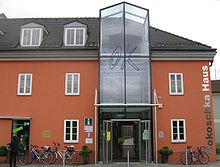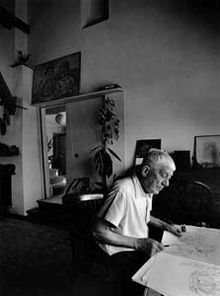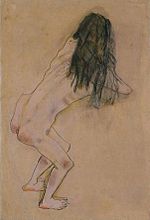- Oskar Kokoschka
-
Oskar Kokoschka 
The Bride of the Wind or The Tempest, oil on canvas, a self-portrait expressing his unrequited love for Alma Mahler, widow of composer Gustav Mahler, 1914Birth name Oskar Kokoschka Born 1 March 1886
Pöchlarn, AustriaDied 22 February 1980 (aged 93)
Montreux, SwitzerlandNationality Austrian
BritishField Painting, poet, playwright Movement Expressionism Oskar Kokoschka (1 March 1886 – 22 February 1980) was an Austrian artist, poet and playwright best known for his intense expressionistic portraits and landscapes.
Contents
Biography
Kokoschka was born in Pöchlarn. His early career was marked by portraits of Viennese celebrities, painted in a nervously animated style. He served in the Austrian army in World War I and was wounded. At the hospital, the doctors decided that he was mentally unstable. Nevertheless, he continued to develop his career as an artist, traveling across Europe and painting the landscape.
Kokoschka had a passionate, often stormy affair with Alma Mahler, shortly after the death of her four-year-old daughter Maria Mahler and her affair with Walter Gropius. After several years together, Alma rejected him, explaining that she was afraid of being too overcome with passion. He continued to love her his entire life, and one of his greatest works The Bride of the Wind (The Tempest), is a tribute to her. His poem Allos Markar[1] was inspired by this relationship. The poet Georg Trakl visited the studio while Kokoschka was painting this masterpiece. Kokoschka also commissioned a life-sized female doll in 1918.[2] Although intended to simulate Alma and receive his affection, the gynoid-Alma did not satisfy Kokoschka and he destroyed it during a party.[2]
Deemed a degenerate by the Nazis, Kokoschka fled Austria in 1934 for Prague. There, his name was adopted by the Oskar-Kokoschka-Bund, founded by other expatriate artists, although he declined to otherwise participate (K. Holz, Modern German Art for Thirties Paris, Prague, and London: Resistance and Acquiescence in a Democratic Public Sphere). In 1938, when the Czechs began to mobilize for the expected invasion of the Wehrmacht, he fled to the United Kingdom and remained there during the war. With the help of the British Committee for Refugees from Czechoslovakia (later the Czech Refugee Trust Fund), all members of the OKB were able to escape through Poland and Sweden.
Kokoschka became a British citizen in 1946 and only in 1978 would regain Austrian citizenship. He traveled briefly to the United States in 1947 before settling in Switzerland, where he lived the rest of his life. He died in Montreux.
Kokoschka had much in common with his contemporary Max Beckmann. Both maintained their independence from German Expressionism, yet they are now regarded as its supreme masters, who delved deeply into the art of past masters to develop unique individual styles. Their individualism left them both orphaned from the main movements of Twentieth Century modernism. Both wrote eloquently of the need to develop the art of "seeing" (Kokoschka emphasized depth perception while Beckmann was concerned with mystical insight into the invisible realm), and both were masters of innovative oil painting techniques anchored in earlier traditions.
Kokoschka's last years were somewhat embittered, as he found himself marginalized as a curious footnote to art history. A noteworthy student of Kokoschka's "School of Seeing" was Konrad Juestel (1924–2001).
Writings
Kokoschka's literary works are as peculiar and interesting as his art. His memoir, A Sea Ringed with Visions, is as wildly psychedelic as anything written by others under the influence of actual hallucinogens.[citation needed] His short play "Murderer, the Hope of Women" (1909, set ten years later by Paul Hindemith as Mörder, Hoffnung der Frauen) is often called the first Expressionist drama. His Orpheus und Eurydike (1918) became an opera by Ernst Krenek, who was first approached for incidental music.
Bibliography
- 1908: Die traumenden Knaben (The Dreaming Youths) Vienna: Wiener Werkstätte (Originally published in an edition of 500 by the Wiener Werkstätte. Unsold copies numbered 1-275, were reissued in 1917 by Kurt Wolff Verlag.)
- 1909: Mörder, Hoffnung der Frauen (Murderer, the Hope of Women) (Play)
- 1913: Der Gefesslte Columbus(Columbus Bound). [Berlin]: Fritz Gurlitt, [1913] (known as Der Weisse Tiertoter (The White Animal Slayer).
- 1919: Orpheus and Eurydike, in: Vier Dramen: Orpheus und Eurydike; Der brennende Dornbusch; Mörder, Hoffnung der Frauen; [and] Hiob. Berlin
- 1962: A Sea Ringed with Visions. London: Thames & Hudson ISBN 978-0500010143 (Autobiography)
- 1974: My Life; translated (from "Mein Leben") by David Britt. London: Thames & Hudson ISBN 0 500 01087 0
First productions of plays
- 1907: Sphinx und Strohmann. Komödie für Automaten. 29 March 1909 at Cabaret Fledermaus, Vienna
- 1909: Mörder, Hoffnung der Frauen
- 1911: Der brennende Dornbusch
- 1913: Sphinx und Strohmann, Ein Curiosum. 14 April 1917 in the Dada-Galerie, Zürich
- 1917: Hiob (an enlarged version of Sphinx und Strohmann, 1907)
- 1919: Orpheus und Eurydike
- 1923: new version as opera libretto; music by Ernst Krenek. 27 November 1926 at the Staatstheater, Kassel
- 1936–38/1972: Comenius
Tributes
- A UK Midlands based 1980's pop group called themselves 'Oskar Kokoschka'. In 1986 they released a 12 inch EP featuring the songs 'Waiting til it all Blows Over' and 'Letting the water out'.[3]
References
- ^ Poem 1913 Translation.Happiness is otherwise an anagram of Alma & Oskar),
- ^ a b "ALMA:History". http://www.alma-mahler.com/engl/almas_life/puppet.html#.
- ^ "Pictures by Covin80s". http://s1122.photobucket.com/albums/l536/Covin80s/#.
- Further sources
- Adamson, Donald "Oskar Kokoschka at Polperro", in: The Cornish Banner, November 2009, pp. 19–33
- Adamson, Donald "Researching Kokoschka", in: The Cornish Banner, November 2010, pp. 22-24
- Extensive article in the Encyclopaedia Britannica
- Holz, K. (2004) Modern German Art for Thirties Paris, Prague, and London: resistance and qcquiescence in a democratic public sphere. Ann Arbor: University of Michigan Press
- Kokoschka, Oskar (1962) A Sea Ringed with Visions. London: Thames & Hudson ISBN 978-0500010143 (Autobiography)
- Weidinger, Alfred (1996) Kokoschka and Alma Mahler. Munich: Prestel-Verlag ISBN 3-7913-1722-9
Literature
- Alfred Weidinger: Oskar Kokoschka. Dreaming Boy and Enfant Terrible. Early Graphic Works, 1902-1909. Ed. Albertina, Vienna 1996.
- Alfred Weidinger: Kokoschka and Alma Mahler: Testimony to a Passionate Relationship. Prestel, New York 1996, ISBN 3-7913-1722-9
Further reading
- Alfred Weidinger, Alice Strobl: Oskar Kokoschka. Die Zeichnungen und Aquarelle 1897-1916. Werkkatalog, 1. Band. Hg. Albertina. Verlag Galerie Welz, Salzburg 2008 ISBN 978-3-85349-290-1
- Hilde Berger: Ob es Hass ist solche Liebe? Oskar Kokoschka und Alma Mahler, Böhlau Verlag, Wien 1999 ISBN 3-205-99103-6
- 2. Auflage 2008 ISBN 978-3-205-78078-6
- Oliver Hilmes: Witwe im Wahn – Das Leben der Alma Mahler-Werfel, Siedler Vlg., München 2004 ISBN 978-3-88680-797-0.
- Wolfgang Maier-Preusker: Buch- und Mappenwerke mit Grafik des Deutschen Expressionismus, Ausst.Kat. für Hansestadt Wismar, Wien 2006 ISBN 3-900208-37-9
- Tilo Richter (ed.): Horst Tappe: KOKOSCHKA, m. Fotografien v. Horst Tappe, Zitaten (d/e/f) u. Grafiken v. Oskar Kokoschka, Vorwort v. Christoph Vitali, Christoph Merian Verlag, Basel 2005 ISBN 3-85616-235-6
- Heinz Spielmann: Oskar Kokoschka – Leben und Werk, Dumont Vlg. Köln 2003 ISBN 978-3-8321-7320-3.
- Alfred Weidinger: Kokoschkas King Lear. Albertina, Wien 1995 ISBN 3-900656-29-0
- Alfred Weidinger: Kokoschka und Alma Mahler – Dokumente einer leidenschaftlichen Begegnung, Reihe 'Pegasus Bibliothek', Prestel Vlg., München/New York 1996 ISBN 3-7913-1711-3. * Widerstand statt Anpassung: Deutsche Kunst im Widerstand gegen den Faschismus 1933–1945, Elefanten Press Verlag GmbH, Berlin 1980
- Norbert Werner (Hg.): Kokoschka – Leben und Werk in Daten und Bildern, Insel Vlg., Frankfurt/M. 1991 ISBN 3-458-32609-X
- Hans M. Wingler, Friedrich Welz: Oskar Kokoschka - Das druckgraphische Werk , Verlag Galerie Welz, Salzburg 1975 ISBN 3-85349-037-9
- Johann Winkler, Katharina Erling: Oskar Kokoschka – Die Gemälde 1906-1929, Verlag Galerie Welz, Salzburg 1995
- Alfred Weidinger: Oskar Kokoschka. Träumender Knabe - Enfant terrible, 1906-1922. Hg. Agnes Husslein-Arco, Alfred Weidinger. Belvedere, Wien 2008 ISBN 978-3-901508-37-0
External links
- Oskar Kokoschka at Find a Grave
- Fondation Oskar Kokoschka at the Musée Jenisch in Vevey, with illustrations of Kokoschka works, text in French
- Kokoschka: Knight Errant of 20th Century Painting, a memorial lecture by Carol Hoorn Fraser
- Gallery of Kokoschka's early works
Categories:- 1886 births
- 1980 deaths
- People from Melk District
- Austrian painters
- Austrian people of Czech descent
- British painters
- Erasmus Prize winners
- Expressionism
- Expressionist dramatists and playwrights
- Landscape artists
- Modernist drama, theatre and performance
- People who emigrated to escape Nazism
- Recipients of the Pour le Mérite (civil class)
- 20th-century painters
Wikimedia Foundation. 2010.



